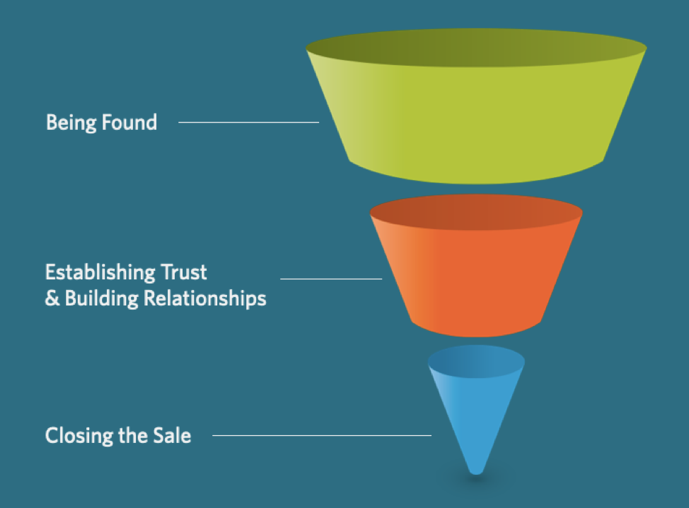How to Use Virtual Marketing
to Convert Leads into New Business
In this post, Dr. Frederiksen shares some thoughts on ways to use virtual marketing to increase visibility, communicate your expertise, and build engagement with prospects. In the age of COVID-19, these marketing techniques are essential to a firm’s survival.

In my most recent post, I explained some key advantages of virtual marketing over more traditional approaches. In this post, I will share some thoughts on ways to use virtual marketing to increase visibility, communicate your expertise, and build engagement with prospects. In the age of COVID-19, these marketing techniques are essential to a firm’s survival.
As potential clients move through your marketing and sales funnel (Figure 1), some virtual techniques have specific areas of impact, while others work well at multiple stages. In this post, I will discuss these techniques in three groups, based on their chief area of impact.
Figure 1: Marketing and Sales Funnel

Techniques to Boost Visibility
- Search Engine Optimization—When facing a new business challenge, most of us start by doing a web search to acquire information and perspective. Building SEO into your website is how you make sure you will be found by clients. SEO involves determining which terms and issues (e.g., keywords) you should target, and then offering helpful content addressing those issues, as well as a well-designed, mobile-friendly website. It takes some work, but it is worth it.
- Guest Blogging—Writing blog posts or articles for other people’s blogs or online publications can help to increase your visibility among target audiences and boost credibility. In some cases, you can include a link back to your own website, which helps make your site easier for prospective clients to find.
- Digital Ads—There are many types of paid digital advertising, including ads that appear on the same page as search results (paid search). Other strategies include targeting certain company roles (such as CTOs or HR directors) to reach a new target audience or communicate a new message. This type of advertising in not widely used by firms in the professional services field, for whom it is not always cost effective.
Techniques to Convey Expertise
- Articles and blog posts—Dedicating a section of your site to blogs and articles is a popular way to demonstrate your expertise in a highly tangible way, and such blogs are often the “content” that search engines find. When blogs are educational and helpful, they attract traffic to your website, increase visibility, and demonstrate your expertise.
- Premium Content—White papers, executive guides, e-books and research reports are all ways to convey your expertise more fully. Such publications are all examples of “premium content” for which prospects are often willing to share their contact information—making it a critical strategy for building an e-mail list.
- Webinars—Online educational events have a similar impact as digital publications but are aural and visual rather than written. Functioning as digital seminars, they can also allow for interactive elements such as Q&A and polls.
- Podcasts—Like radio programs, podcasts are audio recordings of interviews or monologues on topics your target audience cares about. These formats are often both personal and informative, allowing them to convey a sense of familiarity and build relationships with listeners.
Techniques to Engage with Prospects and Close the Sale
- E-mail Marketing—One of the most tried-and-true digital techniques, e-mail still serves a critical role in connecting with individual prospects, delivering content and offers, and winning new business. It also allows you to personalize your marketing, especially when used with marketing automation.
- Video Testimonials and Case Stories—For many years, professional services firms have used case stories and testimonials to convey their expertise and demonstrate how they can help clients. Using video allows these messages to be viewed repeatedly without having to bother your clients. Doing so also helps prospects understand how your expertise might help them, as well as what it is like to work with you.
- Video Conference Calls—Evolving technology and social norms have now changed the video call from a novelty to an essential business development tool. A well-executed video call can be just as effective as a face-to-face meeting for most business purposes—from engaging with prospects to closing sales.
Take the virtual marketing plunge
Long-term trends in professional services buyers’ behavior have set the stage for virtual marketing and business development. The pandemic of 2020, however, has made it a necessity for professional services firms. While the transition to virtual marketing may feel like a bit of a challenge, I can assure you that it is a direct route to faster growth and greater profits.
Lee W. Frederiksen, PhD, is Managing Partner at Hinge, the leading branding and marketing firm for the professional services. Hinge conducts groundbreaking research into high-growth firms and offers a complete suite of services for firms that want to become more visible and grow.
Dr. Frederiksen can be contacted at (703) 391-8870 or by e-mail to LFrederiksen@hingemarketing.com.








